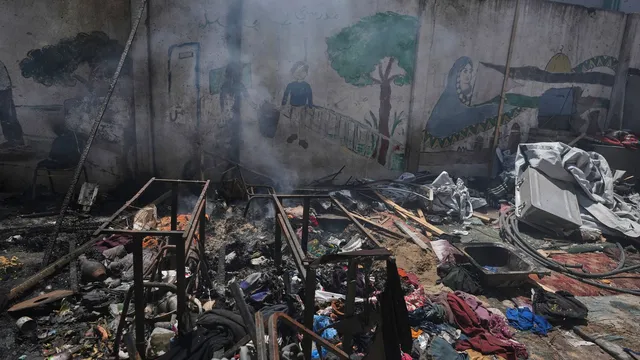
Over 70 Palestinians killed in Gaza as ceasefire talks begin
2025-07-06 19:30- Over 70 Palestinians were killed in Gaza due to Israeli airstrikes over the weekend.
- Hamas and Israel will be negotiating a ceasefire in Qatar amidst ongoing violence.
- The conflict continues to escalate, exacerbating the humanitarian crisis in Gaza.
Express your sentiment!
Insights
In Gaza, a significant escalation of violence occurred over the weekend, resulting in the deaths of over 70 Palestinians within a span of just 48 hours. The unfolding tragedy primarily took place in the Muwasi area, which has become a heavily populated settlement for residents who have been displaced since the onset of the ongoing conflict nearly two years ago. Between July 4 and July 5, 22 Palestinians were killed, and by July 6, the death toll in Muwasi alone had risen to 40 due to additional Israeli airstrikes targeting various locations across the region. These Israeli airstrikes, which reportedly hit 130 targets in a 24-hour period, have caused widespread devastation, claiming numerous civilian lives according to reports from Shifa Hospital in Gaza City. They also resulted in significant numbers of injuries, further exacerbating the humanitarian crisis that the Gaza Strip is currently facing. With a staggering 90% of the population displaced, many residents are living in makeshift settlements and experiencing dire conditions as the situation deteriorates. On the diplomatic front, both Hamas and Israel have sent delegations to Qatar aimed at negotiating a ceasefire. U.S. officials have proposed a 60-day ceasefire that could facilitate crucial humanitarian aid deliveries into Gaza and pave the way for the possible release of hostages held by Hamas since their surprise attack on Israel back in October 2023. This was initially viewed positively by Hamas, who indicated their willingness to engage in serious negotiations regarding the proposed framework. However, the negotiations have been complicated by deep-rooted suspicions and demands from both sides. Israel's conditions for a ceasefire include the complete dismantlement of Hamas, while Hamas is seeking restrictions on Israeli actions that would prevent future operations after the ceasefire concludes. Previous ceasefire efforts have collapsed amid escalated violence, and as Israel prepares to engage in talks, the likelihood of a long-lasting resolution remains uncertain amidst ongoing military actions and widespread civilian casualties.
Contexts
The ongoing humanitarian crisis in Gaza remains a critical issue as of July 2025, marked by severe challenges in access to basic needs, medical care, and infrastructure. The situation is exacerbated by prolonged conflict, economic blockade, and a rapidly deteriorating living environment. Over two million Palestinians are affected, facing heightened levels of poverty, unemployment, and food insecurity. Reports indicate that the health system is on the brink of collapse, primarily due to a lack of medical supplies, personnel, and funding. The United Nations and various NGOs have repeatedly warned that the need for international assistance is urgent, highlighting the dire conditions confronting families in Gaza. Access to clean water and adequate sanitation has plummeted, a direct consequence of damaged infrastructure and restricted movement. Many residents rely on unsafe water sources, which poses significant health risks including outbreaks of preventable diseases. The education sector is also struggling, with numerous schools damaged or destroyed during conflicts, leaving children unable to attend classes and disrupting their learning prospects. Psychosocial support is needed not just for educational continuity but also for helping children cope with trauma from years of violence and instability. The international community has called for sustained humanitarian access, urging donors to provide funding that would alleviate some of these challenges. Humanitarian organizations are advocating for a ceasefire that would allow aid to flow freely into Gaza without fear of interruption from ongoing military operations. Stakeholders stress the importance of adhering to international humanitarian law, emphasizing the need to protect civilians in conflict zones. Without robust international intervention, the situation is likely to worsen, with long-term implications for regional stability and peace. Efforts to rebuild Gaza's infrastructure and restore basic services face numerous political and logistical hurdles. Reconciliation efforts among Palestinian factions and negotiations with Israel remain critical for any progress. However, these efforts are heavily influenced by the dynamics of regional politics, including the positions of neighboring countries and global powers. The humanitarian crisis thus encapsulates not only a local emergency but a broader geopolitical challenge that requires coordinated and sustained international engagement to ensure the safety and dignity of the people of Gaza.